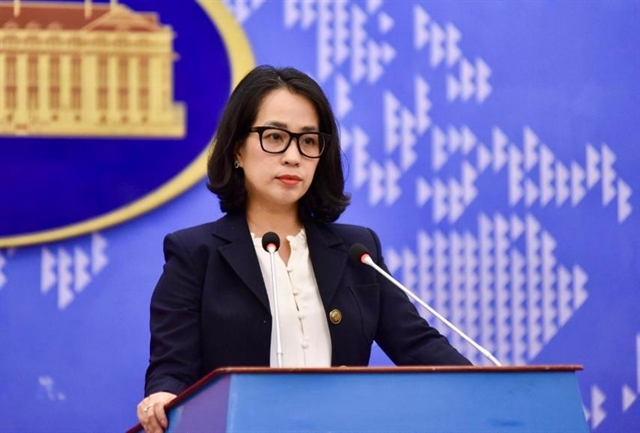 Politics & Law
Politics & Law

.jpg)
|
| Prime Minister Phạm Minh Chính (centre) chairs the first meeting of the Steering Committee for developing the project "Summarising 10 years of implementing Resolution No 22-NQ/TW, dated April 10, 2013 of the Politburo on international integration" on Wednesday morning in Hà Nội.—VNA/VNS Photo Dương Giang |
HÀ NỘI — Việt Nam’s Gross Domestic Product (GDP) has nearly doubled after 10 years of international integration.
This is the result of implementing the Politburo's Resolution No 22-NQ/TW, dated April 10, 2013.
Prime Minister Phạm Minh Chính made the conclusion on Wednesday morning when he chaired the first meeting of the Steering Committee on the project.
“The political position and potential of the country have been raised, international relations have been expanded, the face of the country really changed positively,” Chính said.
Since 2013, Việt Nam has upgraded its relations with seven countries to a Strategic Partnership or a Comprehensive Strategic Partnership; and seven countries to a Comprehensive Partnership, contributing to creating a network with a total of 33 countries, including all major nations.
Việt Nam has also officially participated in peacekeeping operations; extensively participated in many new-generation Free Trade Agreements (FTA) and trade links such as the Comprehensive and Progressive Agreement for Trans-Pacific Partnership (CPTPP) and the EU-Việt Nam Free Trade Agreement (EVFTA), contributing to consolidating and enhancing a favourable and open situation for the country's development.
Shortcomings
He also said besides the achievements, shortcomings are still found in the process of implementing the Resolution.
For example, positivity, initiative and creativity in international integration are still not high; the role of the State in encouraging and creating a favourable environment for individuals, organisations and enterprises to participate in international integration is sometimes ineffective, he said.
The implementation of international agreements and commitments is still limited, he said.
The participation rate in the global value chain of Vietnamese enterprises is still modest. The national synergy has increased, but many indicators and rankings of Việt Nam's national competitiveness and growth level compared to ASEAN countries have not changed much, he added.
The quality of human resources, the level of connectivity between the Foreign Direct Investment (FDI) and domestic economic sectors, as well as the linkages among regions are not high as expected, he said.
Solutions
Thus, he pointed out what needs to be done in the near future.
“We must consider international integration an important driving force for the country's innovation and development,” he said.
“We should closely link international integration with the enhancement of our country's capability, competitiveness, resilience and adaptability to all external fluctuations," he said.
We must firmly grasp the situation, both international conditions and development needs in the country to effectively implement international integration, he said.
“Integration must be intimately connected in all fields. Economic integration should be a focus,” he said.
Integration in other fields must facilitate economic integration and actively contribute to economic development, he said.
Integration must be substantive and follow the spirit of “harmonious benefits, shared risks,” he said.
He said after 10 years of international integration, Việt Nam has participated in many different levels of integration, both bilaterally and multilaterally.
Now is the time to create new developments, effectively take advantage of new trends in the fourth industrial revolution, strategic partnerships and comprehensive partnerships to put the country in the optimal position in the new international situation, making the most of resources for the country's development, he said.
It requires a roadmap and plan to effectively, seriously and fully implement international agreements and commitments, he said.
It has to develop and promote a mechanism to monitor, urge, review and promote the implementation of cooperation agreements that we have signed with other countries, both bilaterally and multilaterally, he said.
"If we don't do that, it not only causes a waste of resources and time but also affects the country's reputation," he said.
There is a very short time until the Steering Committee has to complete the report of the Resolution’s implementation to the Politburo, he said.
Thus, he requested the Steering Committee to advise the Politburo to issue one guiding document on international integration in the new situation.
The document must be strategic and substantive, he said.
It needs to point out the bottlenecks that are hindering the international integration process of the country, and provide solutions to remove the issues and emerging problems in international integration, he said. — VNS